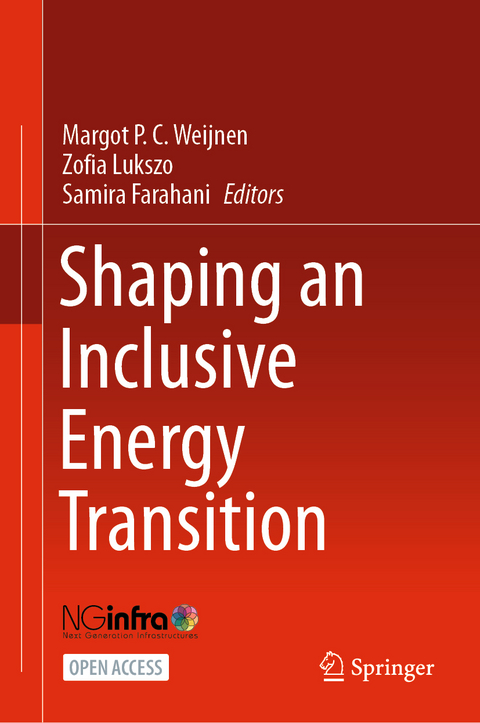
Shaping an Inclusive Energy Transition
Springer International Publishing (Verlag)
978-3-030-74585-1 (ISBN)
This open access book makes a case for a socially inclusive energy transition and illustrates how engineering and public policy professionals can contribute to shaping an inclusive energy transition, building on a socio-technical systems engineering approach. Accomplishing a net-zero greenhouse gas emissions economy in 2050 is a daunting challenge. This book explores the challenges of the energy transition from the perspectives of technological innovation, public policy, social values and ethics. It elaborates on two particular gaps in the design of public policy interventions focused on decarbonization of the energy system and discusses how both could be remedied. First, the siloed organization of public administration fails to account for the many interdependencies between the energy sector, the mobility system, digital infrastructure and the built environment. Cross-sector coordination of policies and policy instruments is needed to avoid potentially adverse effects upon societyand the economy, which may hamper the energy transition rather than accelerate it. Second, energy and climate policies pay insufficient attention to the social values at stake in the energy transition. In addressing these gaps, this book intends to inspire decision makers engaged in the energy transition to embrace the transition as an opportunity to bring a more inclusive society into being.
lt;p>Prof. Dr. Ir. Margot Weijnen is a full professor of Process and Energy Systems Engineering at the Delft University of Technology, since 1995. She is the founding and scientific director of Next Generation Infrastructures, the Dutch national knowledge platform of infrastructure providers, since 2001. She was a member of the Governing Board of the IEEE System, Man and Cybernetics Society and established the IEEE SMC Technical Committee for Infrastructure Systems and Services. She has been engaged in numerous advisory capacities to the Dutch government and the European Commission as a member of, e.g., the EC Advisory Group on Energy, the Netherlands Council for Science and Technology Policy, the Dutch General Energy Counci and the Netherlands Scientific Council for Government Policy. She chairs the Advisory Board of the Royal Netherlands Aerospace Centre and is a member of the Supervisory Board of AkzoNobel Netherlands BV and Shell Netherlands BV. Since March 2020, she sits on the Executive Board of the Dutch National Research Council, where she chairs the Executive Board of the Engineering and Applied Sciences domain.
Prof. Dr. Ir. Zofia Lukszo is a full professor of Smart Energy Systems. She heads the Energy and Industry Group at the Faculty of Technology, Policy and Management at Delft University of Technology. The group is involved in research and education in the field of energy infrastructure systems and focuses on the innovative development of technological "software", i.e. structured methods and tools to support the energy transition. One of the important themes in the research programme concerns modelling and simulation of large-scale infrastructure networks as socio-technical systems using an agent-based approach. Her research concentrates on a wide range of problems in the way complex energy systems are functioning and can be (re-)shaped for a sustainable future. Shaping smart grids, which require additional flexibility from the users in interaction with dispatchable power plants, storage and interconnections, forms main pillars in her research. Zofia is a steering board member of PowerWeb Institute - an interfaculty research programme on smart and integrated energy systems, and a supervisory board member of the Green Village - a living lab connected to the TU Delft. As a senior IEEE member, she contributed to many international workshops and conferences. She has over 150 refereed scientific publications and book contributions.
Dr. Ir. Samira Farahani is an expert in energy system design and analysis with more than ten years of experience. She has obtained her Ph.D. degree in Systems and Control from Delft University of Technology, and since then, she has been working on several projects in the area of smart energy systems focusing on data-driven analysis and optimal operation. In the time of preparation of this book, she was appointed as a senior researcher at the Faculty of Technology, Policy and Management at Delft University of Technology. Prior to this, she was a business strategy manager at the consulting company Accenture. In the past years, she has also worked at prestigious institutes such as TU Delft, Caltech and Max-Plank Institute and has collaborated with several companies such as Eneco, Shell, Stedin, Gasunie, etc. in different projects. Her main area of expertise is in design and analysis of (smart) integrated energy and mobility systems, with emphasis on the role of hydrogen as a new energy carrier in the low-carbon energy transition. Samira is joining the non-profit organization WaterstofNet, as a project manager, in February 2021, to continue supporting the hydrogen development activities in Benelux.
Introduction.- The Fabric of a Changing Society - Infrastructure as the Key to Social Inclusion.- Perspectives on Justice in the Future Energy System.- The Hidden Dimension of the Climate Crisis: Religion, Sustainability and Inclusiveness - a Plea for the (secular) Sacred.- Hydrogen: The Bridge between Africa and Europe.- Decentralised Control and Peer-to-peer Cooperation in Smart Energy Systems.- EU Energy Policies and Projects: a Perspective on an Inclusive Energy Transition.- Moving Towards Nexus Solutions to 'Energy' Problems: an Inclusive Approach.- Good Governance and the Regulation of the District Heating Market.- Enabling Public Participation in Shaping the Inclusive Energy Transition Through Serious Gaming.- A Comprehensive Engineering Approach to Shaping the Future Energy System.
| Erscheinungsdatum | 26.06.2021 |
|---|---|
| Zusatzinfo | XVII, 258 p. 41 illus., 39 illus. in color. |
| Verlagsort | Cham |
| Sprache | englisch |
| Maße | 155 x 235 mm |
| Gewicht | 571 g |
| Themenwelt | Sozialwissenschaften ► Politik / Verwaltung ► Staat / Verwaltung |
| Technik ► Elektrotechnik / Energietechnik | |
| Schlagworte | Climate Change Management • energy poverty • Energy Transition • Engineering Economics • open access • Public Policy • smart energy systems • Social Inclusiveness |
| ISBN-10 | 3-030-74585-6 / 3030745856 |
| ISBN-13 | 978-3-030-74585-1 / 9783030745851 |
| Zustand | Neuware |
| Haben Sie eine Frage zum Produkt? |
aus dem Bereich


